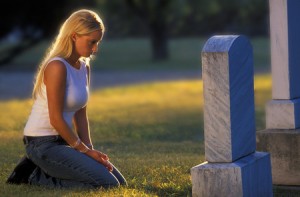Grief and Loss
Grief and Coping with Loss
Coping with loss is one of the most difficult challenges someone can face in their lifetime. Putting undue pressure on one’s self, or anyone else, to follow a plotted course to recovery is usually not helpful. When coping with loss, entering into the five stages of grief does not happen at any particular time or order. In fact, many people may exhibit characteristics of more than one grief stage at the same time, and also freely move between stages without any evidence of healing. There is simply no time frame to recover from grief, nor should there be. And under no circumstance should anyone feel any level of shame associated with their feelings or emotions.
Grief is a very important part of the process whenever we suffer feelings of loss. People experience grief and loss for a variety of reasons such as a changing jobs, moving to a new location, or a significant spouse, child, parent, or pet loss. Grief is a human way to deal with the feelings of love that we believe have ended. There is no one way to grieve, nor is there one solution for everyone. Every individual grieves differently. Also, our society at large does not offer us a general way to honor or truly understand coping with loss. Since we are a society that is always struggling with things like time management, high pressures, and other demands, taking time to grieve…or even knowing how to grieve…is not a big part of our system.
Tools to Cope with Loss
During bereavement, it is a good idea to reach beyond one’s comfort zone and rely on a support system made of friends, relatives, grief counselors, support groups and/or faith-based activities. Even though grieving is quite personal, there are others have experienced similar situations, so seeking out support can be very empowering.
Religion and Faith
Most religions have rituals that can be followed to help with grief and coping with loss. These rituals can provide us with a way to get through the initial shock of grief, and there are many religious organizations and affiliations who are willing to lend a helping hand through individual and group support. However, as many people know who have been through a loss, when the rituals of religion end, there is still grieve and the adjustment of loss to deal with.
Grief Books
There are many books written about grief and many suggestions regarding coping with loss. These grief books can guide you through your pain and enlighten you how to move forward with your life. But as stated before, there is no one single way to grieve, and each person and their situation is unique. Part of that is due to the physical and emotional reactions we have to grief. As human beings, when we experience a significant loss, our body’s initial reaction can often be a state of shock, causing us to disconnect from the reality of the situation we are dealing with. Then, after this initial shock of grief, we begin to feel the effects of things like fear, loss, loneliness, and become overwhelmed with the idea of how this will affect our lives. Reading different types of grief books may open your eyes to new feelings and ideas and help ease your grief.
Your Support System
Coping with loss can cause many people to feel confused and even hopeless, which is exactly why it is necessary to turn to family and friends. Having a strong grief support system can play an extremely important role in knowing that you are not alone, and that there are others who understand what you are going through. The reality is that many of them may have been through, or are currently experiencing, a period of grief and loss themselves. A significant loss affects our life in many ways. How are we going to manage without this person in our life? How will we adjust financially, socially and personally? How will we be able to take on the role of the other person?
One of the major elements in how we grieve is determined by what kind of support system we have. Do we have family and friends who can help us deal with the changes in our life? When we have people we have people to turn to, this can significantly assist in the grieving process. When we do not have a strong support system, coping with loss can sometimes become too much for one person to deal with. In the case of the latter, this would be a time to seek grief counseling.
Professional Grief Counseling
Grief counseling can help you move through the grief easier and more effectively. Grief counseling is a particularly effective method of dealing with grief. Simply seeking out and visiting a counselor will not take away the pain of losing a loved one, but being proactive and seeking support can help assess things, and also help set up a plan of action for recovery in the right direction.
A professional grief counselor or program will help you identify where you are in the grief process, and understand what needs to occur to develop a new way of coping with loss in your life. This usually includes learning how to live without the significant person you have lost. Grief counseling will also help you deal with the feelings and emotions of your loss, both through learning and expressing these feelings with others. There are many examples of the different stages of grief. Elizabeth Kubler Ross was a pioneer in the area of grief and loss. She developed the stages of grief that are now an important aspect of grief counseling.
Additional Information About Grief and Loss:
Grief Message Boards
Loss of a Child
Loss of a Parent
Loss of a Pet
Loss of a Sibling
Loss of a Spouse







